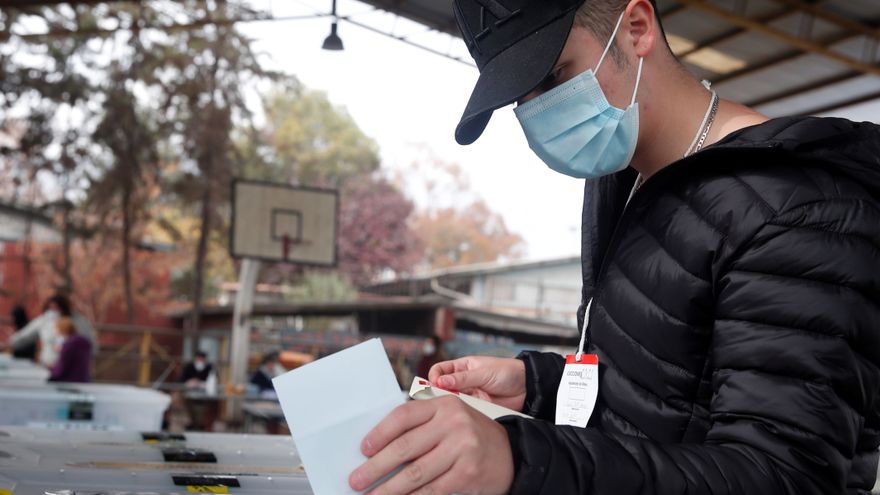RIO DE JANEIRO, BRAZIL – A year and a half ago, young people put the system in check with a revolt for a fairer model, unparalleled in Chilean democracy. Their discontent triggered an unprecedented constituent process, and their participation in this weekend’s elections is crucial to legitimizing it.
Pedro Saéz, 25, got up early to cast his vote in a locale in eastern Santiago. It is the first time he had participated in an election, and believes that “something” woke up in his generation on October 18, 2019, when massive protests broke out, leaving some thirty dead and thousands injured.

“We are going to write a Constitution for the next 30 years, and it seems to me that it would be irresponsible to stay at home,” said a student.
For Lucas Ramirez, 19 years old and also a first-time voter, “it is important that the same old people do not decide for us what happens in the country”.
ALMOST HALF OF THE ELECTORATE
Of the 14.9 million citizens called to elect the 155 convention members who will draft a new Constitution to replace the current one – of neoliberal bias and inherited from the military dictatorship – 41.3% are under 40 years of age, an age group with high abstention rates, except for the October plebiscite.
In that vote, which was the way out of the revolts encountered by the political class and in which 80% of voters decided to bury the Constitution of Augusto Pinochet’s regime (1973-1990), the participation of young people between 18 and 25 years old rose by 20%, compared to 36% in the 2017 presidential election.
“Youth participation in October leads one to think that young people should vote in a similar way, but there is also the possibility that they interpret that the constituent process has been satelized by the parties and they subtract themselves from the elections,” explained Mauricio Morales, an academic at the University of Talca.
Since voting ceased to be compulsory in 2012, “there are class and age biases” and “more educated, higher income and older people tend to vote more,” said Julieta Suárez Chao, a political scientist Pontificia Universidad Católica de Chile.
Morales added that the class bias is much more pronounced among young people. The chances of a young person from Vitacura (a wealthy neighborhood in Santiago) going out to vote are “extremely higher” than one from a poor neighborhood like La Pintana.
WHAT IF THEY DON’T VOTE?
Amalia Galvéz, 25, is convinced that there will be a large turnout and says that her circle of friends “have been well informed about the candidates and are very active in the process”. Less optimistic is Rodrigo Onores, 30, who has been disappointed to see “empty” several voting centers.
“The atmosphere has not been the most propitious, between the encirclement by covid, the deep crisis of the traditional parties, and the feeling that the political elite is privileging its own interests over those of the rest,” said Lucia Dammert, a sociologist at the University of Santiago de Chile.
In any case, added the expert, the fact that young people do not vote does not mean that they are not politically active: “The generation that is now between 30 and 40 played a leading role in the student marches of 2006 and 2011, which led to more free higher education, and they did not turn out in the elections”.
For Morales, if the participation in the elections -in which mayors, councilmen, and governors are also elected at the same time- is lower than the 50.9% of the plebiscite, the convention that will draft the new text in a maximum term of one year “will not be illegitimate, but it will be weakened”.
In this case, according to Suárez Chao, the convention “will not be able to meet behind closed doors and will have to seek channels for the participation of civil society and a broader dialogue”.
The new Magna Carta must be submitted to a referendum in 2022. If ratified, it would be the first one born from a parity and fully democratic and participative process in the country’s history.
In a forceful message on Twitter, poet Raúl Zurita – 71 years old and winner of the 2020 Queen Sofia Prize for Ibero-American Poetry – appealed to the young people who came face to face with security forces in the massive protests of 2019 and who were referred to as the “front line”.
“Every vote is a stone to the heart of the system! -published Zurita- Young first, second, fourth, fourth, seventh lines and all lines, all and all stand up to vote!”.

